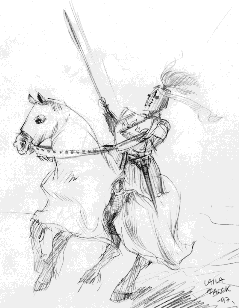Meet the Middle Ages
BackKnights and foot-soldiers

All noblemen had a duty to provide weapons, armour and horses for the defence of the country. The knights were noblemen who were close to the King. At his coronation or at some other grand occasion, the King gave a number of chosen noblemen knight-hoods. This was done at the ceremony of dubbing, after which the knight was titled "Sir". The King had both young and old men dubbed, people he thought might be of use to him.
In battle, the cavalry, with armed knights and noblemen, were the strongest part of the army. When they came galloping over the battlefield, the enemy feared for their lives.
The foot soldiers were an important part of the army as well. All grown men had a duty to defend their country. When a war was declared, the beacons were lit and a fiery cross sent around which meant that everyone had to meet at a certain place. The peasants arrived with their weapons; bows, cross-bows, spears and halberds. Noblemen and knights came, as well as mercenaries employed by the King. Together, they fought the enemy. Horse-men and mercenaries did most of the actual fighting. The peasants did too, but they also had other tasks such as building obstacles and lying in ambush. Their bows and spears could be very effective.
The peasants who had to leave their farms and go off to battle, probably did so with a heavy heart. They knew that they might lose an arm or a leg, or worse, lose their lives.
On the next page, you can read about the arms of the knights and foot soldiers.
If you want to learn more about becoming a knight and the vows of the knight, go to " Society. Classes of Society"